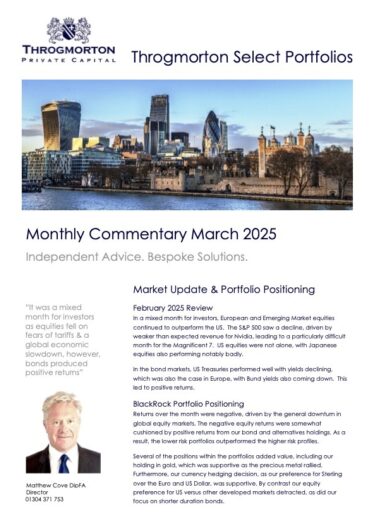Our monthly portfolio positioning commentary.

In a mixed month for investors, European and Emerging Market equities continued to outperform the US. The S&P 500 saw a decline, driven by weaker than expected revenue for Nvidia, leading to a particularly difficult month for the Magnificent 7. US equities were not alone, with Japanese equities also performing notably badly.
January saw a change to 2024’s status quo with European markets outperforming the US, albeit most equity markets broadly produced positive returns. This was despite the supportive ‘America First’ policy agenda of the Trump administration, as US equities were impacted by the emergence of the Chinese Artificial Intelligence (AI) company, DeepSeek.
Equities experienced a volatile December, with developed markets underperforming emerging markets. US equities sold off as a result of the more hawkish tone from the US Federal Reserve and the political instability in France and South Korea, impacted European and Asian equities respectively. Whilst Asian markets on the whole declined, Chinese equities outperformed its peer group as investors reacted well to the Central Government’s commitment to stabilising both the equity and property markets. Furthermore, rising bond yields in the US and European nations lead to falling bond values.
The US stock market rose sharply in November as investors considered the implications of the clean sweep Republican US election victory. Outside of US markets, the election results were met with some caution, mainly due to the threat of a fresh round of tariffs being imposed. This was most impactful on emerging markets and specifically in China, where equities declined due to concerns about a potential trade conflict with the US and negative investor sentiment towards the government’s economic support measures introduced to revive the econom
In October, financial markets were volatile despite robust economic data from the US. Equities on the whole delivered negative performance, with US equities performing the best among developed markets. Weaker-than- expected earnings from Apple, Meta, and Microsoft impacted US equity performance, while European equities under-performed due to weaker corporate earnings reports. Emerging market equities faced challenges, mainly driven by Indian, and to a lesser extent, Chinese, equities.
Fixed income assets struggled over the month, with bonds selling off as yields rose. However, gold rallied to a new high.
In September, equity markets faced challenges but recovered due to a pick-up in macroeconomic data and expansionary monetary policy, which alleviated recession concerns. Both the US Federal Reserve and the European Central Bank (ECB) delivered rate cuts of 0.5% and 0.25% respectively. Additionally, positive momentum in China helped contribute to global equity performance. Global equities ended the month in positive territory.
August was a positive, but volatile month for bonds and equities. At the start of the month, the interest rate rise in Japan and weak economic data in the US, initially led to equity markets selling off, which was also further impacted by the political uncertainty around the US presidential election.
